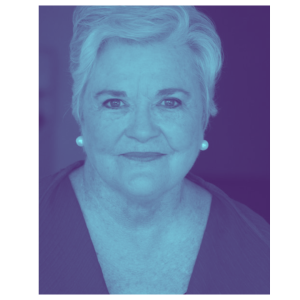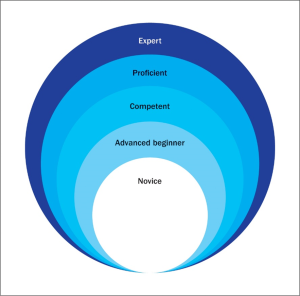5 Novice to Expert Nursing Theorist: Patricia Benner
Learning Objectives
- Describe the development of “expert nurses,” summarizing Benner’s stages of clinical competence
- Explain the ethical foundations of caring as ethical practice, why should technology not be a substitute for the human connection between healthcare providers and patients?
- Explain the importance of storytelling in nursing, drawing on Patricia Benner’s work
Novice to Expert Nursing Theorist: Patricia Benner
Figure 5-1
Patricia Benner Nurse Theorist

Note: Educating Nurses with Patricia Benner (2025). https://educatingnurses.com/
Patricia Benner is a nurse theorist and author known for her work on the development of clinical expertise in nursing. Her book, From Novice to Expert, describes five stages of skill acquisition in nursing: novice, advanced beginner, competent, proficient, and expert (Benner, 1994). Benner’s work is grounded in interpretive phenomenology, which involves studying “persons, events, and practices in their own terms” (Benner, 1994). She explains that novice nurses rely on rules and guidelines, while expert nurses develop an intuitive grasp of patient situations (Benner, 1994).
Benner’s work is relevant to novice nurses because it emphasizes the importance of caring and the social determinants of health (Benner, 1996). Benner stresses that nurses need to understand patients’ life stories to provide effective care (Benner, 1996 ). Benner encourages nurses to embrace the “primacy of caring,” which is rooted in ethical practice (Benner, 1996).
The skill of involvement is defined by Benner (2022) as necessary to expert-level nursing and it brings humanity, meaningfulness, acute situational awareness, and rapid thinking required for strong clinical decision-making in crisis management of the deteriorating patient.
Benner Stages of Skill Acquisition in Nursing
Benner et al. (2009), attribute time accumulated in practice to each of the five stages of skill acquisition in nursing 1) novice – the first year of education 2) advanced beginner – new graduate 3) competent – 1 to 2 years in practice 4) proficient – a Transitional Stage on the way to expertise 5) expert – Phronesis (Practical Wisdom).
Figure 5-2 Novice to Expert

Benner’s 2009 book, Expertise in Nursing Practice: Caring, Clinical Judgement, and Ethics. Benner et al. (2009), continue the Novice to Expert (Benner, 2001) seminal work utilizing the Dreyfus Model of Skill Acquisition. The Dreyfus Model is situational not trait or talent-based (Benner et al., 2009). Essentially to reach the expert level the learner will demonstrate intuitive decision-making and commitment or immersion that is described as involved understanding, involved deciding, and involved outcome (Dreyfus, 2004).
Figure 5-3 Dreyfus Five Stages of Skill Acquisition
Image to large resize
Note: (Dreyfus, 2004, p. 181).
Benner’s Stages of Clinical Competence
Patricia Benner’s Novice to Expert theory is a framework for understanding how nurses develop expertise over time (Benner, 1994). Benner’s work highlights the importance of both practical experience and theoretical knowledge in developing clinical competence. Her model identifies five stages of skill acquisition (Benner, 1994):
- Novice: Novice nurses have limited experience and rely on rules and guidelines to make decisions.
- Advanced Beginner: Advanced beginners start to recognize patterns and develop more flexibility in their practice.
- Competent: Competent nurses can plan and prioritize care, and they begin to develop a deeper understanding of patient needs.
- Proficient: Proficient nurses have a holistic understanding of patient situations and can see the big picture.
- Expert: Expert nurses have an intuitive grasp of patient situations and can make clinical judgments based on experience and deep understanding.
As nurses progress through these stages, they develop a greater understanding of patient care and become more skilled in providing compassionate and individualized care. Benner’s work is particularly relevant for novice nurses who are just beginning their journey in nursing. By understanding the stages of clinical competence, novice nurses can identify their own strengths and areas for growth. They can also appreciate the importance of lifelong learning in developing nursing expertise.
The Ethical Foundations of Caring
Caring is at the heart of nursing, and Benner emphasizes that caring is not merely a sentimental feeling but an ethical practice rooted in a deep respect for human dignity (Benner, 1994; Benner, 1996). Ethical practice involves recognizing the unique needs of each patient and advocating for their best interests. Benner cautions against relying too heavily on technology, arguing that technology should not be a substitute for the human connection between healthcare providers and patients.
While technology can be a valuable tool in healthcare, it should not be allowed to replace the essential elements of human interaction (Benner, 1996; Phillips & Benner, 1996). Compassionate care requires healthcare providers to be fully present with patients, listening attentively to their concerns and providing emotional support (Benner, 1996; Phillips & Benner, 1996). This human connection is essential for building trust and fostering healing.
David C. Thomasma in Phillips (1996) underscores this point, highlighting the importance of “compassionate involvement with the sick and dying” (Phillips & Benner, 1996). Thomasma argues that a purely rationalistic approach to bioethics, one that prioritizes autonomy and removes particularity, can lead to dehumanizing practices (Phillips & Benner, 1996). Compassionate care, on the other hand, considers the unique needs and values of each patient and seeks to provide holistic care (Phillips & Benner, 1996).
The Art of Nursing: Storytelling
Patricia Benner urges nurses to embrace the art of storytelling, emphasizing that sharing their experiences is crucial for both personal and professional growth (McShane, 1996). By telling their stories, nurses can help others understand the challenges and rewards of nursing, promoting greater appreciation for the profession (McShane, 1996). Storytelling is particularly important in a changing healthcare environment where nursing’s value is sometimes overlooked (Benner, 1996). Storytelling can also play a crucial role in providing holistic care. When nurses listen attentively to patients’ stories, they gain a deeper understanding of their patients’ lives, values, and concerns.
This understanding can inform care decisions and help nurses address the social determinants of health that impact their patients’ well-being. By acknowledging the social, economic, and cultural factors that influence health, nurses can provide more comprehensive and compassionate care.
Furthermore, storytelling can help nurses reflect on their own experiences and develop their clinical judgment McShane, 1994). Benner encourages nurses to engage in “interpretive phenomenology”, a process that involves carefully examining their experiences and the experiences of others (McShane, 1994). Through reflection and dialogue, nurses can gain insights into their own practice and develop a more nuanced understanding of patient care.
Remember, as you embark on your nursing journey, embrace the art of storytelling, prioritize compassionate care, and strive for clinical excellence. By understanding Benner’s theory and its implications, you can make a profound difference in the lives of your patients.
Skill of Involvement
Nursing is a socially embedded practice (Benner et al., 2009). The skill of involvement includes holistic cognitive processes that most humans possess. Novice nurses lack experience in the clinical setting. Benner et al. (2009) state that novice nurses have “secondary ignorance and cannot know what they do not know” (p. 96). The novice nurse cannot rely on the salience obtained from practice that the proficient or expert-level nurse has gained.
There are human dimensions of the experience of illness that SOI uncovers through the presence of the patient. The human experience of illness cannot be completely “conveyed through decontextualized abstract labels or disengaged, analytical reasoning” (Benner et al., 2009). Skill of involvement uncovers the “patient story, meanings, intents, and concerns” (Benner et al., 2009, p. 211). The skill of involvement and life experience, including experienced SDOH, provide the nursing student with additional insight to guide clinical decision-making.
Implications for Basic Pre-Licensure Nursing Education
Benner et al. (2009) purport that a significant change in nursing education is needed and suggests that “as we help students learn clinical skills, they also must learn how to be with and take care of patients” (p. 370). Nursing students in undergraduate education need to understand how ethical principles translate to ethical comportment, as well as clinical decision-making that is informed by notions of good. “Sound clinical reasoning informed by the best available evidence and by a deep understanding of the patient’s concerns remain constant as the environment of care has been reinvented many times over” (Benner et al., 2009, p. 370).
Implications for Nursing Education:
Patricia Benner’s 2011 article, “Formation in Professional Education,” offers crucial insights for nursing educators navigating today’s complex healthcare landscape. Benner emphasizes that professional formation goes beyond mere socialization into roles and norms; it involves a transformation of the individual’s skilled capacities, moral perception, and agency (Benner, 2011). This message underscores the need for nursing education to integrate three key elements:
Skill of Involvement: Benner challenges the limitations of a purely technical, detached approach to healthcare. Instead, she champions a “skill of involvement” that emphasizes the nurse’s attunement and responsiveness to the patient’s unique needs and experiences. This approach recognizes that effective caregiving requires more than technical proficiency; it demands perceptual acuity, skilled know-how, and a genuine presence with the patient (Benner, 2011).
Ethical Comportment: Building on this concept of involvement, Benner underscores the importance of ethical comportment in nursing practice. She argues that caring practices require “moral sources” (Benner, 2011) that go beyond self-focused moralism. True caring involves reaching out to the other with skillful responsiveness and “no strings attached” (Benner, 2011), acknowledging the inherent vulnerability and dignity of each patient.
Social Determinants of Health: Benner’s work implicitly connects to the broader context of social determinants of health. She emphasizes that understanding the patient’s “life-world” (Benner, 2011) is essential for effective care. This understanding encompasses the social, economic, and cultural factors that shape a patient’s health and well-being. By recognizing these influences, nurses can provide more holistic and equitable care.
Benner’s message to educators is clear: nursing education must cultivate not only technical competence but also the skills of involvement, ethical comportment, and an understanding of the social determinants of health. These elements are crucial for preparing nurses to provide compassionate and effective care in an increasingly complex healthcare environment. By integrating these concepts into curricula and clinical experiences, nursing educators can empower future generations of nurses to become true advocates for patient well-being.
References:
Benner, P. (1994). The tradition and skill of interpretive phenomenology in studying health, illness, and caring practices. In P. Benner (Ed.), Interpretive phenomenology: Embodiment, caring, and ethics in health and illness (pp. 99–129). Sage.
McShane C. (1996). Envisioning our future. Patricia Benner: nurses must tell nursing stories. Nebraska Nurse, 29(2), 1–5.
Benner, P. (2011). Formation in professional education: An examination of the relationship between theories of meaning and theories of the self. Journal of Medicine and Philosophy, 36(3), 342–353. https://doi.org/10.1093/jmp/jhr030
Dreyfus, S. E. (2004). The five-stage model of adult skill acquisition. Bulletin of Science, Technology & Society, 24(3), 177-181. https://doi-org.lynx.lib.usm.edu/10.1177/0270467604264992
Phillips, S. S., Benner, P. (Eds.). (1996). The crisis of care: Affirming and restoring caring practices in the helping professions. Georgetown University Press.

